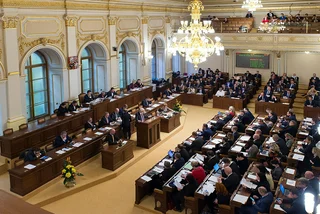The Czech Senate has approved the nominations of three senior judges for the Constitutional Court, on the basis of President Petr Pavel’s prior nominations. They will serve a 10-year term. Former vice-president of the International Criminal Court Robert Fremr, Prague Metropolitan Court Deputy Head Veronika Křesťanová, and civil law professor Kateřina Ronovská will be a part of the 15-member team of judges.
One judge with a controversial past
Fremr, who is also the deputy head of the Prague High Court, received criticism from some Czech senators due to his past involvement in the Olšany cemetery case, according to iRozhlas. He was accused of knowingly collaborating with the Czech secret services (State Security; StB) during an investigation into the vandalism of monuments at the cemetery.
From October to November 1989, Fremr was also a member of the then-Communist Party of Czechoslovakia. Pavel earlier this week defended Fremr’s credibility and moral integrity, standing by his nomination. During his nomination speech, Fremr expressed his commitment to bringing his extensive knowledge of international law and criminal justice to the Constitutional Court.
He highlighted the relevance of addressing international issues such as the conflict in Ukraine, migration concerns, climate crises, gender equality, and the regulation of artificial intelligence within the court's purview.
Křesťanová, on the other hand, emphasized her intention to leverage her multifaceted background in the legal profession, the judiciary, and academia to ensure transparency and clarity in judicial reasoning. Meanwhile, Ronovská pledged to apply her expertise in private law with humility and a balanced perspective. Fremr received 36 out of 67 votes from the Senate, while both Křesťanová and Ronovská each got 12 votes more.
The task of the Czech Constitutional Court is mainly to protect constitutionality, fundamental rights, and freedoms arising from the constitution, the Charter of Fundamental Rights and Freedoms, and other constitutional laws. It is separate from the system of general courts in Czechia. It votes on a majority basis; at least eight judges have to vote in favor of a ruling for it to pass.
SOME ASPECTS THE CONSTITUIONAL COURT RULES ON
- The repeal of laws or other legal regulations
- Constitutional complaints by local self-government bodies against illegal state intervention
- The measures necessary to implement the decision of an international court, which is binding for the Czech Republic, if it cannot be implemented otherwise
- An appeal against the election, or dismissal, of a deputy or senator due to their unsuitability
- A decision regarding curtailing the activity of a political party; whether it is in accordance with constitutional or other laws
Pavel pleased with selections, with one more spot to fill
Pavel will have to submit one more candidate for the post of Constitutional Court judge later this year, given that Radovan Suchánek's mandate will end on Nov. 26.
The Czech president said Wednesday that he was pleased that the Senate has approved three more of his nominations for constitutional judges. He also said he was "convinced" that they are personalities who will significantly enrich the Constitutional Court.
"Their professional profile fits in with my idea of the composition of the Constitutional Court as a mosaic of different legal professions, perspectives, and experience," said Pavel, who came to the Senate Wednesday to present his candidates.
Earlier this year, Pavel nominated former Supreme Administrative Court head Josef Baxa, constitutional law professor Jan Wintr, and former head of the Judges Union Daniela Zemanová as constitutional judges.
At present, there is just one woman who is a Constitutional Court judge – Zemanová. However, with the new terms of Ronovská and Křesťanová, the court may rule on subjects that support women’s rights, such as violence against women, abortion, and same-sex marriage.













 Reading time: 3 minutes
Reading time: 3 minutes 


























